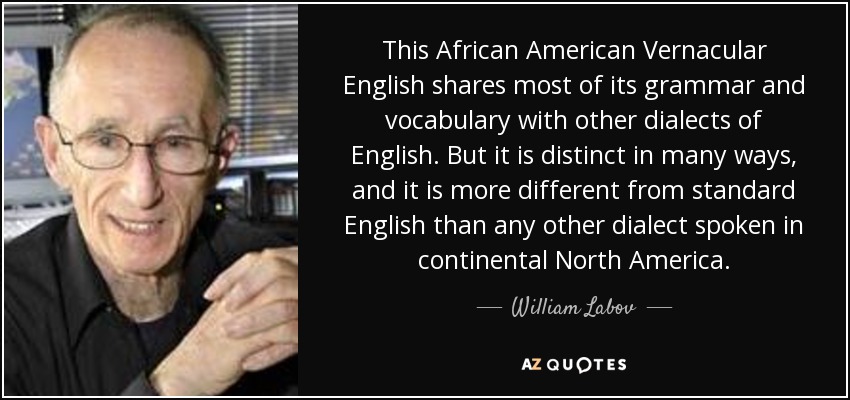African American Vernacular English
African American Vernacular English (AAVE) has a number of names, including Black Vernacular English. For many decades now linguists have studied AAVE. They understand it not as a defective form of Standard English. Rather it is a variety of English in its own right. It has its own lexicon, grammar and syntax.
Title image: William Labov. Many consider him to be the world’s most famous sociolinguist.
I do not use this blog to discuss politics. However, given the current national events of past few months, I am reposting earlier blogs if they have renewed relevance. Today’s blog originally dates from February 19, 2018.
The phrase “shut up and dribble” has recently returned to the news. Two years ago Fox New Commentator Laura Ingraham uttered it. And I wrote the blog, below, in response. The Dave Chappelle comedy special released three days ago revived it.
And yesterday columnist Mark Madden published an article entitled “NBA players should continue to dribble but not shut up.”
African American Vernacular English: LeBron James v. Laura Ingraham
I just said I do not use this blog to discuss politics. However, I do comment on language. And the remarks made on February 15, 2018 by Laura Ingraham about the linguistic abilities of LeBron James caught my attention.
Listen to her critique of James’s “barely intelligible not to mention ungrammatical take on President Trump”:
She received widespread criticism for these remarks as being racist. She countered: “If pro athletes and entertainers want to freelance as political pundits, then they should not be surprised when they’re called out for insulting politicians. There was no racial intent in my remarks.”
However, it was not her “shut up and dribble” comment that was racist. It was her conflation of James’s supposedly unintelligible English with his supposed political ignorance.
African American Vernacular English: Language Is Identity
Language is identity. I have written this in many previous blogs. When you attack someone’s language, you attack their identity. James speaks AAVE. And Ingraham does not. By attacking his language, she attacked a high-profile identity marker of his race. Of course she thinks she’s “merely” attacking his political views. But it’s her linguistic criticism that activates her racism. And in her follow-up defense she does not address her linguistic criticism.
Her voice drips with sarcasm when she speaks of his “gripping insight.” She asks, “Must they run their mouths like that?” Her exasperation is great for the supposed grammatical lapse in Kevin Durant’s assertion to LeBron. He said, “I feel like our country is not ran by a great coach.” What she really exposes is her own great ignorance. AAVE has quite a number of past tense forms that do not match those of Standard English.
James and Durant grew up as members of a community. They speak according to their community’s norms. We all do. Repeat: we all do. So, yes, they must run their mouths like that. Just as you, Laura, run yours the way you do.
As a linguist, I have a responsibility to point out two things.
First, when you attack a person’s speaking norms, you attack their identity.
Second, AAVE is not sub-standard English. It is non-standard.
African American Vernacular English: Language and Linguistics on Trial
John Rickford is a well-known linguist at Stanford University. Sharese King is a linguistics graduate student at Stanford. In 2016 they published an article entitled “Language and Linguistics on Trial: Hearing Rachel Jeantel (and Other Vernacular Speakers) in the Courtroom and Beyond.” It appeared in Language, the main publication of the Linguistic Society of America.
Remember Rachel Jeantel? Maybe not. But you likely remember Trayvon Martin. He was shot and killed by George Zimmerman in 2012. Zimmerman went on trial and was acquitted.
Here’s the abstract to the Rickford-King article:
“Rachel Jeantel was the leading prosecution witness when George Zimmerman was tried for killing Trayvon Martin, but she spoke in African American Vernacular English (AAVE) and her crucial testimony was dismissed as incomprehensible and not credible. The disregard for her speech in court and the media is familiar to vernacular speakers and puts Linguistics itself on trial: following Saussure, how do we dispel such ‘prejudices’ and ‘fictions’? We show that Jeantel speaks a highly systematic AAVE, with possible Caribbean influence. We also discuss voice quality and other factors that bedeviled her testimony, including dialect unfamiliarity and institutionalized racism. Finally, we suggest strategies for linguists to help vernacular speakers be better heard in courtrooms and beyond.” (Emphasis mine.)
Here is a link to the full article: Language and Linguistics On Trial
When someone in the public sphere stigmatizes a non-standard variety as “unintelligible” I must speak up. Ingraham clearly understood what James was saying. Otherwise she could not have critiqued his ideas. I have a professional responsibility to speak out and correct misinformed views of AAVE. The charge of “unintelligible” is a smug and easy way to dismiss what a speaker has to say.
Categorised in: Blog, Language, Thoughts
This post was written by Julie Tetel Andresen
You may also like these stories:
- google+
- comment



